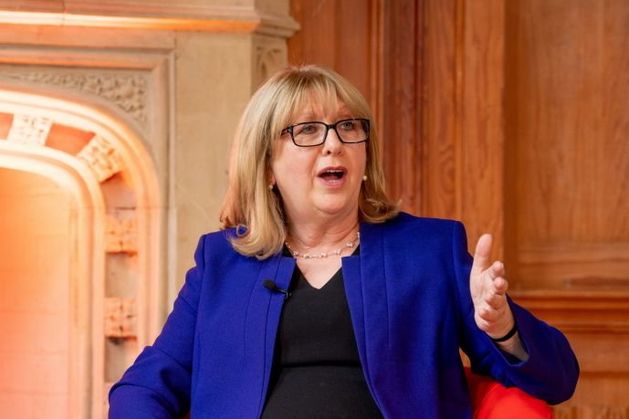Mary McAleese Expresses Concern for Irish Troops in Lebanon
Understanding the Concerns Surrounding Irish Troops in Lebanon
When it comes to global peacekeeping efforts, countries often send their brave soldiers into some of the most challenging environments on the planet. One such mission is the ongoing deployment of Irish troops in Lebanon, a situation that has recently caught the attention of former President Mary McAleese.
In a world teeming with conflict, the role of peacekeepers is more critical than ever. They work tirelessly to ensure safety, stability, and peace in areas beleaguered by war and unrest. But with such a noble undertaking comes substantial risk, a reality that McAleese has voiced her concerns about—particularly regarding the safety and welfare of Irish troops stationed in Lebanon.
The Context: Irish Troops in Lebanon
Irish troops have been a part of the United Nations Interim Force in Lebanon (UNIFIL) since 1978. This peacekeeping mission was initiated to maintain stability in the region following the Israeli invasion of Lebanon. The mandate? To oversee the withdrawal of Israeli forces, restore peace and security, and assist the Lebanese government in ensuring that the country can maintain its sovereignty.
But let’s be real—Lebanon’s landscape is rife with complexities, filled with various factions, historical grievances, and ongoing tensions between different groups. So, what does this mean for our troops?
The Risks Involved
Deployments like these are not without danger. The Irish soldiers serving in Lebanon face multifaceted hazards that can arise from both the operational and geographical aspects of their mission. Some key concerns include:
- Exposure to Hostile Environments: The potential for violent clashes is ever-present in this politically charged region.
- Health Risks: The possibility of infectious diseases, along with mental health challenges stemming from the stress of the mission, can’t be overlooked.
- Logistical Challenges: Ensuring proper supply lines and maintaining morale can be strenuous when stationed far from home.
When you think about it, placing your life on the line for global peace requires immense bravery. It’s like walking on a tightrope—one misstep can lead to dire consequences.
Mary McAleese’s Concern
Mary McAleese, a former Irish president and a respected voice both nationally and internationally, has openly expressed her apprehensions regarding the safety and conditions faced by Irish troops in Lebanon. Her concerns resonate deeply with many, and they are worth discussing.
Why should one person’s opinion matter so much? Well, McAleese’s insights shed light on the emotional and physical toll that these missions can impose on soldiers and their families. After all, families back home often endure significant stress worrying about their loved ones.
Emphasizing the Human Element
McAleese emphasizes that it’s not just about the political and military angle; it’s fundamentally about the human experience. The soldiers are not mere numbers or stats on a page; they are individuals with families, hopes, and dreams. Imagine the anxiety that swells in a mother’s chest while waiting for news from her son, who’s somewhere in an unstable region of the world.
The human element is crucial here. The emotional toll on both the soldiers and their families should not be underestimated.
Why This Matters
So, what does this mean for the average person? Why should you care? Because these peacekeeping missions reflect our collective responsibility and moral obligation toward global peace and order. It’s akin to being part of a community—when one neighbor is in trouble, the entire neighborhood feels the impact.
Moreover, the safety of troops should be a shared concern because they represent the ideals of peace and stability. If they are endangered, it becomes a reflection of our commitment to those ideals.
Potential Solutions
What can be done to address the concerns raised? Well, there are a few areas where improvements might make a tangible difference:
- Enhanced Training Programs: Preparing soldiers for the unique challenges they may face can boost their confidence and combat readiness.
- Mental Health Support: Acknowledging the psychological burdens that these missions carry is vital. Providing better resources for mental well-being can mitigate some of these concerns.
- Increased Transparency: Maintaining open lines of communication with the soldiers’ families can ease anxieties. Regular updates can also make families feel connected, even from afar.
By considering these avenues for development, we might just strike a better balance between global intervention and the well-being of those we send into the fray.
The Bigger Picture: Global Peacekeeping
Looking beyond the immediate concerns, this scenario opens up a broader discussion about global peacekeeping and its significance in today’s world. As conflicts continue to arise in various regions, the need for dedicated and well-trained peacekeepers becomes increasingly critical.
The Role of International Cooperation
Resolving global conflicts doesn’t fall solely on the shoulders of one country. It requires a united front, with nations cooperating to create lasting solutions. This could be a wake-up call for countries to actively engage in dialogues about shared responsibilities, resource allocation, and the well-being of troops.
Remember that famous childhood saying, “It takes a village to raise a child”? The same principle applies here—the burden of peacekeeping should not rest on a single entity; instead, it’s a collective effort.
Conclusion
Mary McAleese’s concerns about Irish troops in Lebanon serve as a timely reminder of the risks involved in peacekeeping missions. It is imperative that we recognize the sacrifices made by these brave individuals and remain vigilant in ensuring their safety and well-being. As members of a global community, we all play a role in supporting the men and women who stand on the front lines of conflict.
Let’s engage in the conversation, advocate for better support systems, and recognize the humanity in every soldier. After all, ensuring tranquility and peace is an effort worthy of our commitment.
FAQs
The Irish troops are part of the United Nations Interim Force in Lebanon (UNIFIL), established to maintain peace and stability in the region.
They face exposure to hostile environments, health risks, and logistical challenges.
McAleese expressed worry about the safety and well-being of the Irish troops, emphasizing the emotional and physical toll on soldiers and their families.
Improvements can include enhanced training, better mental health support, and increased transparency with families.
Global cooperation is vital because resolving conflicts requires the collective efforts of multiple nations, ensuring a unified and effective approach.







